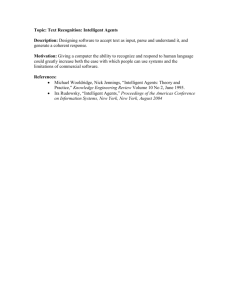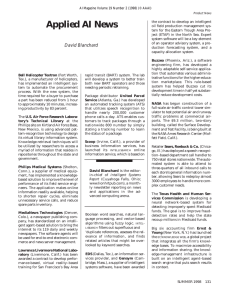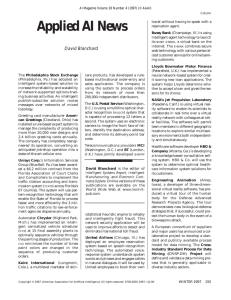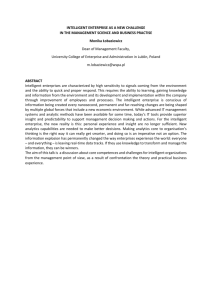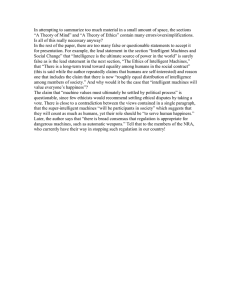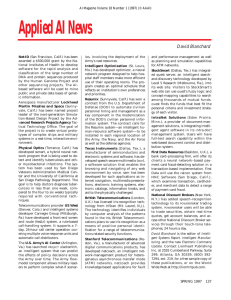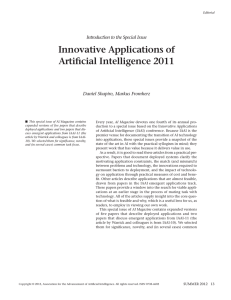ware. On future visits, donors can be
advertisement
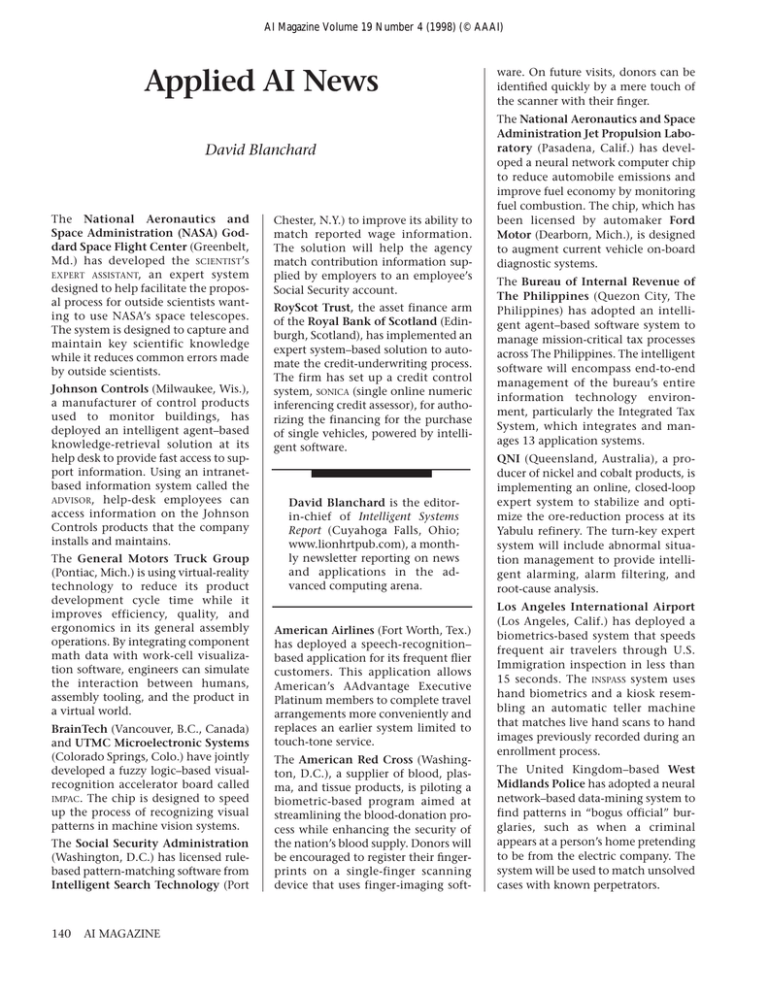
AI Magazine Volume 19 Number 4 (1998) (© AAAI) Applied AI News David Blanchard The National Aeronautics and Space Administration (NASA) Goddard Space Flight Center (Greenbelt, Md.) has developed the SCIENTIST’ S EXPERT ASSISTANT, an expert system designed to help facilitate the proposal process for outside scientists wanting to use NASA’s space telescopes. The system is designed to capture and maintain key scientific knowledge while it reduces common errors made by outside scientists. Johnson Controls (Milwaukee, Wis.), a manufacturer of control products used to monitor buildings, has deployed an intelligent agent–based knowledge-retrieval solution at its help desk to provide fast access to support information. Using an intranetbased information system called the ADVISOR, help-desk employees can access information on the Johnson Controls products that the company installs and maintains. The General Motors Truck Group (Pontiac, Mich.) is using virtual-reality technology to reduce its product development cycle time while it improves efficiency, quality, and ergonomics in its general assembly operations. By integrating component math data with work-cell visualization software, engineers can simulate the interaction between humans, assembly tooling, and the product in a virtual world. BrainTech (Vancouver, B.C., Canada) and UTMC Microelectronic Systems (Colorado Springs, Colo.) have jointly developed a fuzzy logic–based visualrecognition accelerator board called IMPAC. The chip is designed to speed up the process of recognizing visual patterns in machine vision systems. The Social Security Administration (Washington, D.C.) has licensed rulebased pattern-matching software from Intelligent Search Technology (Port 140 AI MAGAZINE Chester, N.Y.) to improve its ability to match reported wage information. The solution will help the agency match contribution information supplied by employers to an employee’s Social Security account. RoyScot Trust, the asset finance arm of the Royal Bank of Scotland (Edinburgh, Scotland), has implemented an expert system–based solution to automate the credit-underwriting process. The firm has set up a credit control system, SONICA (single online numeric inferencing credit assessor), for authorizing the financing for the purchase of single vehicles, powered by intelligent software. David Blanchard is the editorin-chief of Intelligent Systems Report (Cuyahoga Falls, Ohio; www.lionhrtpub.com), a monthly newsletter reporting on news and applications in the advanced computing arena. American Airlines (Fort Worth, Tex.) has deployed a speech-recognition– based application for its frequent flier customers. This application allows American’s AAdvantage Executive Platinum members to complete travel arrangements more conveniently and replaces an earlier system limited to touch-tone service. The American Red Cross (Washington, D.C.), a supplier of blood, plasma, and tissue products, is piloting a biometric-based program aimed at streamlining the blood-donation process while enhancing the security of the nation’s blood supply. Donors will be encouraged to register their fingerprints on a single-finger scanning device that uses finger-imaging soft- ware. On future visits, donors can be identified quickly by a mere touch of the scanner with their finger. The National Aeronautics and Space Administration Jet Propulsion Laboratory (Pasadena, Calif.) has developed a neural network computer chip to reduce automobile emissions and improve fuel economy by monitoring fuel combustion. The chip, which has been licensed by automaker Ford Motor (Dearborn, Mich.), is designed to augment current vehicle on-board diagnostic systems. The Bureau of Internal Revenue of The Philippines (Quezon City, The Philippines) has adopted an intelligent agent–based software system to manage mission-critical tax processes across The Philippines. The intelligent software will encompass end-to-end management of the bureau’s entire information technology environment, particularly the Integrated Tax System, which integrates and manages 13 application systems. QNI (Queensland, Australia), a producer of nickel and cobalt products, is implementing an online, closed-loop expert system to stabilize and optimize the ore-reduction process at its Yabulu refinery. The turn-key expert system will include abnormal situation management to provide intelligent alarming, alarm filtering, and root-cause analysis. Los Angeles International Airport (Los Angeles, Calif.) has deployed a biometrics-based system that speeds frequent air travelers through U.S. Immigration inspection in less than 15 seconds. The INSPASS system uses hand biometrics and a kiosk resembling an automatic teller machine that matches live hand scans to hand images previously recorded during an enrollment process. The United Kingdom–based West Midlands Police has adopted a neural network–based data-mining system to find patterns in “bogus official” burglaries, such as when a criminal appears at a person’s home pretending to be from the electric company. The system will be used to match unsolved cases with known perpetrators.
